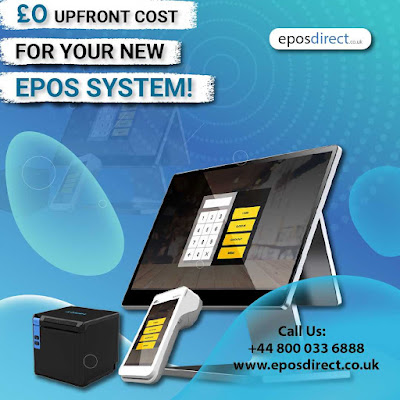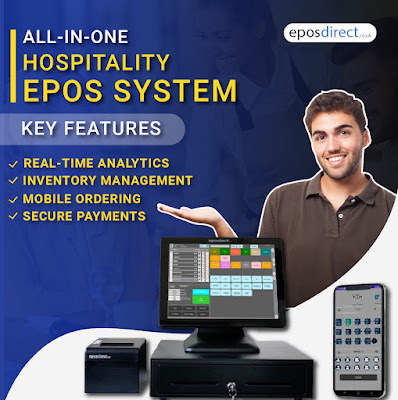In the ever-evolving landscape of
business operations, leveraging cutting-edge technology is paramount for
sustained growth and efficiency. One such technology that has revolutionized
the way businesses operate is the All-in-One EPOS (Electronic Point of Sale)
system. This comprehensive solution has become a cornerstone for various
industries, particularly in the realms of hospitality and retail. In this
article, we will explore the multifaceted benefits of adopting an All-in-One
EPOS system
and how it can significantly enhance business efficiency.
Understanding the All-in-One EPOS
System
An All-in-One EPOS system is a
centralized platform that integrates various business processes, such as sales,
inventory management, and customer relationship management (CRM), into a
single, cohesive unit. This system employs advanced software and hardware
components to streamline day-to-day operations, providing businesses with
real-time insights and analytics. The all-encompassing nature of this solution
has made it an invaluable asset for both small and large enterprises.
The Key Components of an All-in-One EPOS System
1.
Point of Sale (POS) Terminal:
At the heart of the All-in-One
EPOS system lies the POS terminal, a sophisticated device that facilitates
transactions and automates the sales process. This terminal is equipped with a
user-friendly interface, making it easy for staff to process orders, accept
payments, and issue receipts seamlessly.
2.
Inventory Management:
Effective inventory management is
crucial for businesses in both the hospitality and retail sectors. An
All-in-One EPOS system enables businesses to keep track of stock levels in
real-time, automate reorder processes, and minimize the risk of stockouts. This
feature is particularly beneficial for streamlining supply chain operations and
ensuring that products are always available for customers.
3.
Customer Relationship Management (CRM):
Building and maintaining strong
relationships with customers is pivotal for business success. An EPOS system
with integrated CRM capabilities allows businesses to collect and analyze
customer data, personalize interactions, and implement targeted marketing
strategies. This, in turn, enhances customer loyalty and promotes repeat
business.
4.
Reporting and Analytics:
The power of data cannot be
overstated in today's business landscape. All-in-One EPOS systems provide
robust reporting and analytics tools that offer valuable insights into sales
trends, customer behavior, and overall business performance. This data-driven
approach empowers businesses to make informed decisions, identify areas for
improvement, and optimize their operations for maximum efficiency.
Benefits of All-in-One EPOS
System for Hospitality
1.
Streamlined Order Processing:
In the hospitality industry,
where speed and accuracy are paramount, an All-in-One EPOS system streamlines
order processing, reducing the time it takes to input and fulfill customer
orders. This not only enhances customer satisfaction but also increases the
efficiency of the entire service workflow.
2.
Table Management and Reservations:
EPOS systems designed for the
hospitality sector often include features for table management and
reservations. This functionality allows restaurants and cafes to optimize
seating arrangements, track reservations, and provide a seamless dining
experience for customers.
3.
Integrated Payment Processing:
With integrated payment
processing capabilities, an All-in-One EPOS system simplifies transactions for
both customers and staff. This not only reduces the likelihood of errors but
also enhances the security of payment processes, safeguarding sensitive
customer information.
4.
Loyalty Programs and Promotions:
The ability to implement and
manage loyalty programs and promotions is a key advantage of EPOS systems for
hospitality. Businesses can reward loyal customers, track the effectiveness of
promotional campaigns, and adjust strategies based on real-time data.
Benefits of All-in-One EPOS
System for Retail
1.
Efficient Checkout Process:
In the retail sector, where quick
and efficient transactions are crucial, an All-in-One EPOS system expedites the
checkout process. Barcode scanning, inventory lookup, and seamless payment
integration contribute to a smooth and hassle-free experience for both
customers and staff.
2.
Inventory Accuracy and Control:
Retail businesses face constant
challenges in managing inventory. An EPOS system for retail provides real-time visibility
into stock levels, reducing the likelihood of overstock or stockouts. This
leads to improved inventory accuracy and better control over supply chain
operations.
3.
Multi-Channel Sales Integration:
With the rise of e-commerce and
omnichannel retailing, an All-in-One EPOS system seamlessly integrates various
sales channels. This enables businesses to manage online and offline sales from
a single platform, ensuring a cohesive and consistent shopping experience for
customers across different touchpoints.
4.
Data-Driven Merchandising:
Retailers can harness the power
of data analytics provided by EPOS systems to optimize their merchandising
strategies. By understanding customer preferences, purchasing patterns, and
product performance, businesses can make informed decisions regarding product
placement, pricing, and promotions.
Challenges
and Considerations
While the benefits of adopting an
All-in-One EPOS system are significant, businesses should also be aware of
potential challenges and considerations.
1.
Cost of Implementation:
The initial cost of implementing
an All-in-One EPOS system, including hardware, software, and training, can be a
significant investment for businesses. However, it's essential to view this as
a long-term investment that will yield substantial returns in terms of
efficiency and improved operations.
2.
Integration with Existing Systems:
Businesses with existing systems
may face challenges in integrating an All-in-One EPOS system seamlessly.
Compatibility issues and data migration processes need to be carefully planned
and executed to avoid disruptions in day-to-day operations.
3.
Staff Training and Adoption:
The successful implementation of
an EPOS system relies on the effective training and adoption by the staff.
Businesses should allocate sufficient resources for training programs to ensure
that employees are comfortable and proficient in using the new system.
4.
Data Security and Compliance:
Given the sensitive nature of
customer and transaction data, businesses must prioritize data security and
compliance with regulations. Choosing a reputable EPOS provider with robust
security measures is essential to safeguarding sensitive information.
EPOS Direct – Best Epos Solutions
Provider in UK
EPOS Direct stands out as a
leading Electronic Point of Sale (EPOS) solutions provider in the United
Kingdom, offering comprehensive and cutting-edge services to businesses across
various industries. With a commitment to innovation and customer satisfaction,
EPOS Direct has earned a reputation for delivering top-notch EPOS systems
tailored to meet the unique needs of its clients.
The company's strength lies in
its advanced technology, providing businesses with efficient and user-friendly
EPOS solutions that streamline operations and enhance overall productivity.
EPOS Direct's systems are designed to handle various aspects of retail and
hospitality management, including inventory control, sales tracking, and
customer relationship management.
What sets EPOS Direct apart is its
dedication to staying ahead of industry trends, ensuring that clients benefit
from the latest technological advancements. The company's customer-centric
approach involves thorough consultations to understand specific business
requirements, resulting in bespoke EPOS solutions that maximize efficiency and
drive profitability.
Furthermore, EPOS Direct
prioritizes ongoing support and training, empowering clients to make the most
of their EPOS systems. This commitment to excellence has positioned EPOS Direct
as a trusted partner for businesses seeking reliable and state-of-the-art EPOS
solutions in the dynamic landscape of the UK retail and hospitality sectors.
Conclusion
In conclusion, adopting an
All-in-One EPOS system can be a game-changer for businesses in the hospitality
and retail sectors. The comprehensive features, including streamlined order
processing, inventory management, CRM, and analytics, contribute to enhanced
efficiency and improved customer experiences. While there are challenges to
consider, the long-term benefits far outweigh the initial investments.
Businesses that leverage the power of an All-in-One EPOS system position themselves at the forefront of technological innovation, gaining a competitive edge in today's dynamic market. Whether in the bustling environment of a restaurant or the fast-paced world of retail, the integration of an EPOS system proves to be a strategic move toward achieving operational excellence and driving sustained growth.




